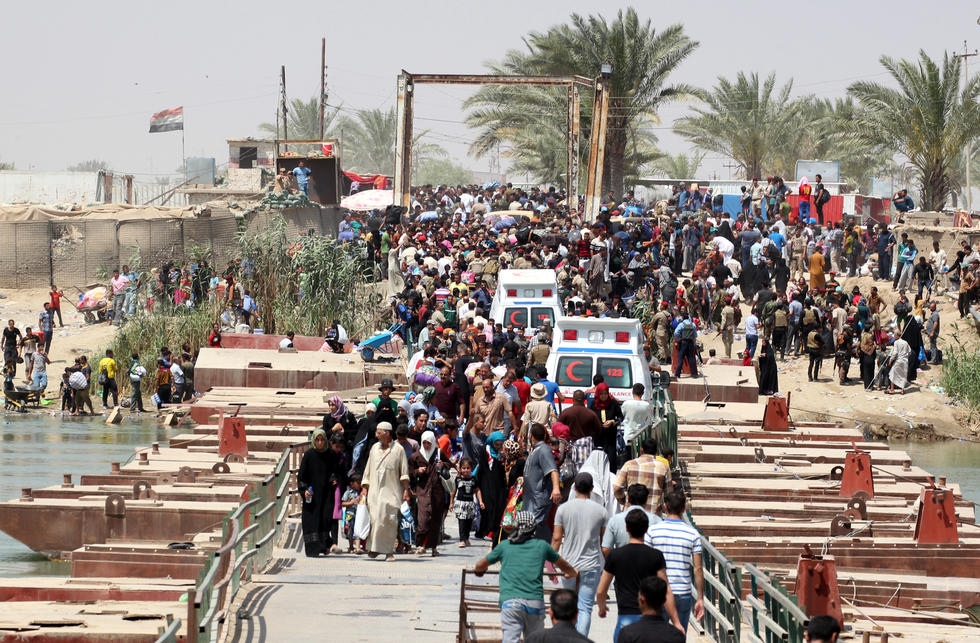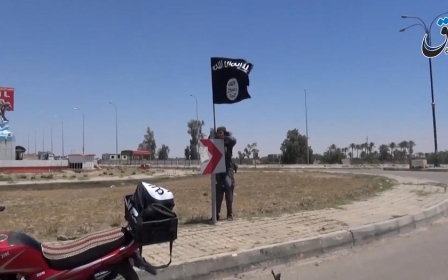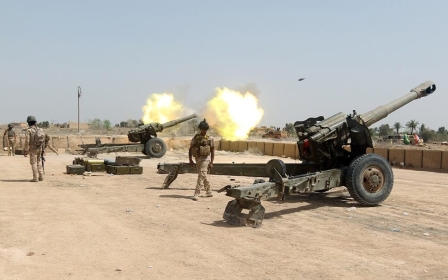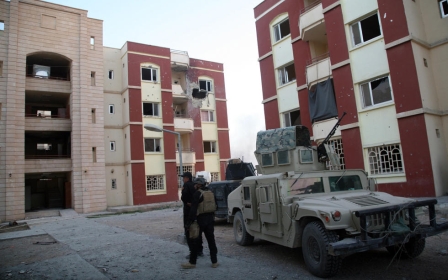ANALYSIS: What to expect after Ramadi’s fall

Ramadi, the capital city of Iraq’s geographically largest province Anbar, fell to the Islamic State on Sunday, leaving a raft of questions in its wake about how the war against the militants should be handled and whether a new course of action is needed.
The humanitarian cost has been big. More than 500 people, including fighters and civilians, were killed in the three day battle. According to the International Organisation for Migration 40,000 people were forced to flee their homes, with some still waiting to be allowed entry into Baghdad, 100 kilometres to the east.
“Thousands of people had to sleep in the open because they didn’t have places to stay,” said Lisa Grande, the UN’s humanitarian coordinator.
The western province, which is predominantly populated by Sunni Iraqis, has witnessed a steady advance of IS. Over the last year and a half, the group, which has always has long had a foothold in the Anbar, managed to capture a string of towns on the Iraq-Syrian border, before burrowing deeper toward Ramadi. As the militants marches west, the cities of Rawah, Anah and Haditha were all captured by IS.
Then Prime Minister Nour al-Maliki had failed to address this advance as Iraqi officials from the city have repeatedly expressed their frustration over the poorly armed and disorganised security forces who were stationed in one of Iraq’s most restive quarters. While Maliki was forced to step down last year ahead of the US-led coalition announcing its war against IS, critics argue that not enough has been done to prevent Ramadi’s fall.
Khalid al-Alwani, a member of the predominantly Sunni Muttahidoon block and the Iraqi Islamic party, conveyed his anger at the Iraqi government’s slow response and inability to keep IS at bay.
“How can we explain why the government failed to heed our call for months and months regarding the danger that IS presented to the province?” he told Middle East Eye. “Why would the government give us light weaponry which are no match for the weapons that IS have?”
The US-led airstrikes managed to hold the advance at bay for a little while, but IS eventually managed to enter the city using a sandstorm as a cover from aerial strikes. By the time the sandstorm cleared it was too late, as IS and the Iraqi security forces were too close to each for coalition air strikes to be effective.
On Sunday, the Iraqi security forces withdrew from their bases in Ramadi, following confusion regarding orders from the central command and unclear news of reinforcements being sent their way or not.
Government failure to defend Ramadi
Alwani said that over the past year and a half, as one city fell to IS after another, appeals to the government for assistance to secure Ramadi’s defence were ignored. The government’s programme, with the United States’ approval, was to arm the local Sunni tribesmen and station troops belonging to the Iraqi army in the city, as proof that Sunni and Shiite forces could work together. Yet Alwani said that the programme was only ever half-hearted.
“All of the leaders of the different security forces such as the police chief and head of the [operation] units have been chosen based on centralised decisions in Baghdad,” Alwani said, recalling that the government ignored the province’s administration request that all security forces should be chosen by them. “It’s true some of them are from Anbar, but that doesn’t mean they have the capability or the experience of leading a battle.”
“The head of the operations units and the police chief are weak and incompetent and couldn’t save Ramadi, so how can we expect them to defend the other cities in Anbar? But the government preferred this strategy instead of properly arming the local Sunni tribesmen,” he continued, adding that the government failed to adapt their preparation for the tribesmen in the fight against IS.
Sajad Jiyad, an Iraqi analyst based in Baghdad, told Middle East Eye that the IS takeover of Ramadi was hardly surprising, despite the assistance of US-led coalition firepower.
“Ramadi’s fall was expected. The security forces there were poorly equipped and lacked coordination and experience. The city is like a ghost town now,” he said.
Shiite paramilitaries advance
The failure of Maliki’s successor Haider al-Abadi to organise a Sunni-led fighting force to defend the city has increased the dejection felt by some of the country’s Sunni population, who say they have felt increasingly left out of the central political arena.
Abadi has now given the green light for allied paramilitary Shiite forces, known as the Popular Mobilisation units, or Hashed al-Shabi, to recapture the city. Around 3,000 troops are on standby at the Habbaniyeh military base, 20 kilometres east of Ramadi. Once they advance, however, they might not find themselves particularly welcome.
“We did not ask for the Popular Mobilisation Units’ help,” Alwani said. “They cannot resolve the problems in this province or in other provinces. But I expect that IS will be driven out of Ramadi, and the PMUs will emerge in the image of Superman as [the] saviours and victors.”
But while there may be knock on consequences in Ramadi, Jiyad believes that at least the paramilitary advance will stop IS in its tracks and prevent it from advancing further toward Baghdad. The outcome will be similar to the one in Tikrit, which was recaptured by the paramilitaries after battling IS in March, he said.
“There are no fears that IS will advance to Baghdad,” he said. “I expect Ramadi will follow in the same suit as Tikrit, where different forces will be working together against IS.”
Whether these different forces will be able to unite to provide some kind of enduring stability, however, is another matter entirely.
According to Alwani the PMUs are “a hundred times” stronger than the Iraqi army.
“A lot of the military leaders know that they do not possess the weapons that these units - who are backed by Iranian military experts and consultants - have,” he said.
But the issue is about more than just weapons. Critics argue that much like in Mosul, which fell to IS last year, the army has been an inherent part of the problem and that corrupt commanders gave up US-made weapons as well as army secrets to IS in exchange for large payoff.
Hayder al-Khoei, an associate fellow at Chatham House, says that widespread corruption amongst the military has only worked to compound the PMU’s authority further.
“The fact that now we’re hearing reports that Ramadi fell in very similar circumstances to Mosul because of corrupt army officers is what is actually increasing the credibility of the PMUs and their effectiveness,” Khoei said.
“People don’t want to send their sons to die for corrupt officers who are going to sell them out to IS. Even the American language [about the IS takeover] is interesting. In Tikrit a few months ago they were saying we’re not going to get involved if the PMUs get involved.”
“But now they’re saying we’ll accept the PMUs on the condition that they be under the Iraqi army command. And that’s what Abadi will try to do.”
Bloody revenge battles
Following damning reports of the behaviour undertaken by PMUs after securing Tikrit - which included burning houses belonging to Sunni families and executions - there are fears that should Ramadi be wrested from the clutches of IS, the same vicious cycle of retribution could unfurl.
Thus it is no surprise that Sunni tribes in Ramadi are divided about supporting or opposing IS – a divide that only further complicates the already difficult dynamic and could bode badly for Ramadi.
Khoei believes that Ramadi is now destined to be attacked from all sides.
“I think we’re going to see much worse in Ramadi but that’s not necessarily because of the PMUs,” Khoei told Middle East Eye. “Unlike Tikrit, Ramadi is bitterly split, with tribesmen from the same family fighting against and for IS.”
“If the [anti-IS] tribes restore control, their revenge against IS us going to be bloody,” he added. “[On the other hand,] the longer IS controls Ramadi, the more we’re going to see public executions of anti-IS tribes.”
No boots on the ground
Any further upticks in violence also threaten to undermine the US-led coalition’s policy of airstrikes and throw it into the spotlight. Questions have already been thrown up about whether boots on the ground might be needed to push back IS especially as the group has repeatedly shown itself capable of evading the worst of the hits by hiding underground or in civilian areas.
However, while there have been some Republican voices arguing in favour of a few dual-pronged offensive, Khoei says that the US does not have “the stomach for another ground war in Iraq”.
“There’s a very delicate balance between the US and Iran when it comes to fighting IS in Iraq,” he said. “The Iranians are happy with the US training and supporting Iraqi paramilitaries, and in providing their air strikes as cover as was demonstrated by [the operation in] Tikrit, but they will not tolerate boots on the ground.”
Instead, Alistair Baskey, the US National Security Council spokesman, told AFP that the US was looking into how to best support local ground forces in Anbar, “including the training and equipping of local tribes and supporting an Iraqi-led operation to retake Ramadi”.
For Alwani, however, this is a case of too little too late. According to the Sunni politician the US only intervenes when it is in their interests to so and did not do nearly enough to prevent Ramadi’s fall.
“They are leaving us to bleed and then they intervene. They hold the larger share of responsibility for leaving us prey to Iran and the Shiite militias that call themselves the popular mobilisation units,” he said.
New MEE newsletter: Jerusalem Dispatch
Sign up to get the latest insights and analysis on Israel-Palestine, alongside Turkey Unpacked and other MEE newsletters
Middle East Eye delivers independent and unrivalled coverage and analysis of the Middle East, North Africa and beyond. To learn more about republishing this content and the associated fees, please fill out this form. More about MEE can be found here.




